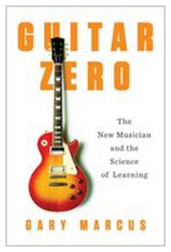Joel Lurie Grishaver
 I saw The Artist this weekend. It is the story of a publishing company in the age of technology. I also learned how hard it is to get text for an article off my Nook. E-books, for the most part, can’t be down loaded into a text file, so you have to retype them. I tried photocopying the screen to get a hard copy. Simple to say, it was a failure. That left me typing off the screen. The bad news is if you have to retype text from the screen that screen dies if you don’t touch it—which is rather hard if you are typing with two hands.
I saw The Artist this weekend. It is the story of a publishing company in the age of technology. I also learned how hard it is to get text for an article off my Nook. E-books, for the most part, can’t be down loaded into a text file, so you have to retype them. I tried photocopying the screen to get a hard copy. Simple to say, it was a failure. That left me typing off the screen. The bad news is if you have to retype text from the screen that screen dies if you don’t touch it—which is rather hard if you are typing with two hands.
 But, this is about a book that went from an article in the New York Times to my hands in under two minutes. That’s one for technology. The book, Guitar Zero, by Gary Marcus is a play on Guitar Hero, the video game that got the author believing that he might learn play guitar after all. Dr. Marcus, a professor of cognitive psychology, who is an expert in neurobiology, writes about his own successes and failures at the guitar in those contexts. He took a year’s sabbatical to learn to play. It becomes “Guitar Zero: The New Musician and the Science of Learning”.
But, this is about a book that went from an article in the New York Times to my hands in under two minutes. That’s one for technology. The book, Guitar Zero, by Gary Marcus is a play on Guitar Hero, the video game that got the author believing that he might learn play guitar after all. Dr. Marcus, a professor of cognitive psychology, who is an expert in neurobiology, writes about his own successes and failures at the guitar in those contexts. He took a year’s sabbatical to learn to play. It becomes “Guitar Zero: The New Musician and the Science of Learning”.
For our purposes, there is a lot of correlation between learning to play guitar and mastering the sounding out (decoding) of the Hebrew Language. Dr. Marcus’ book can teach us a lot about that part of our enterprise.
So let’s start with the problem: K. Anders Ericsson, a psychologist, says that it takes “10,000 hours” of practice to become an expert. Expert, in our terms, means reading out loud a blind Hebrew text fluently. Dr. Marcus explains that while there are prodigies who can achieve success with less, but ten years of 1,000 hours of lessons and practice is what it takes most people to succeed.
Not surprisingly, look at what Gary Marcus defines as a good teacher:
A good teacher is not only a good diagnostician of course, but also a good motivator. Had my teacher urged me to go home and simply practice alternating short notes and long notes, I would no doubt have been bored out of my mind…The truly talented teacher diagnoses the problem and then proposes a treatment that is both fun and rewarding. It the larger literature on teaching and training…studies consistently point to the abilities of the teacher to motivate their students, to understand their particular needs, and to come up with exercises that are neither too easy nor too hard (shades of the principal of proximal development.)
As I write this, I can see the heads shake. We all know that two parental commandments stand in our way:
- Thou shalt not take up too much of my child’s time.
- Thou shalt not give homework.
I know the problems, but let’s look a little more are what Dr. Marcus has to say about teachers:
Why do we need teachers at all? The most obvious answer is that teachers know things that their students don’t.…Another reason, of course is that teachers can serve as motivators…either through carrots…or through sticks.…Good teachers can also impose structure, helping to know what to practice and when. It is not enough to say, “Go home and practice; a good teacher says what to practice, and how: the most skilled teachers aim to help their students practice efficiently. Beyond all this, the most important role of a teacher may be to help the students pinpoint their errors and target their weaknesses. Beginning students especially are often too busy trying to make music.
His model of good teaching does come from private lessons, but it makes some powerful challenges. He suggests that the most important teaching skills are (a) diagnosis of problem, (b) appropriate individual remediation, and (c) provide motivation.
Dr. Marcus credits his willingness to pick up a guitar and to start learning to a video. Guitar Hero made over $2,000,000 in a year at its pick—and still its producer, Activision, decided it wasn’t profitable enough and discontinued manufacturing the game. We in Jewish education can’t hope for the kind of development money that was involved. Dr. Marcus makes it clear that while Guitar Hero was great motivation and helped him get over his fear of music making, it still took teachers to empower and motivate his actual playing of the guitar.
Here is one more piece to look at—the parents role in the students mastering of guitar or piano:
She knew that kids would only practice at home if doing so was pleasurable. What most impressed me about Michele was the immense pains she took to make sure her student’s parents were well instructed, especially in the art of making practice a happy and regular part of every day’s routine. The single point that Michele was most adamant about was a rule for when parents should correct a child’s mistake: never, ever, until the child had made that error at least three times.…If practice with Mom or Dad got to be a drag, the whole game was lost. Michele made sure that never happened, sprinkling her weekly parents-only night class with sound techniques for wanting their children to excel right away and being patient enough to foster a happy learning environment.
Imagine parents coming to a weekly class about how to be the parent of a music student. Now, push the idea forward to Hebrew school. That is really partnership with parents. The takeaways from this book are the following. When it comes to teaching Hebrew decoding:
- Video games do have a role in motivating and empowering student mastery of Hebrew.
- There is a point where human teachers need to take over the teaching role.
- As we hire and train Hebrew teachers the focus needs to be on (1) diagnosis, (2) remediation and (3) motivation.
- To get practice to happen we really need the trust and support of parents.
At the moment, and Torah Aura has been working on it, there is a call for experiential education. Among the things that Experiential Education asks is that: (1) learners take responsibility for their own learning, (2) that learning builds community, and (3) challenge is involved.
Learning a musical instrument involves students taking responsibility for their own learning and a challenge is definitely involved. Hebrew can do the same. You can add to it a family component (but that is an essay to come). The simple truth here is that Hebrew learning can be experiential and can involve teachers and technology. It is not an all or nothing question. But, let’s not leave the teacher out of the equation. In Dr. Marcus’ words:
What may be more important is whether they are equipped to listen well and give feedback that is simultaneously constructive and enthusiastic. It is not about the technique, it’s about the teacher.
Jewish education has been quick to adopt the summer camp metaphor that leads us through informal education and towards experiential education. It is time we realize that it needs to be meshed with the music lesson model and affirm great teaching along with camp counseling and code writing.

